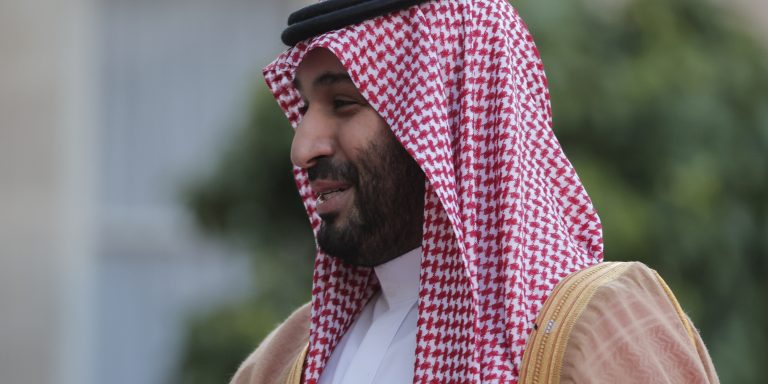INTELBRIEF
October 3, 2022
IntelBrief: Saudi Crown Prince Elevated and Insulated from Accountability

Bottom Line up Front
- Saudi Arabia’s 86-year-old King Salman elevated his son, Crown Prince Mohammad bin Salman (MBS), to Prime Minister, virtually ensuring that there will not be a succession struggle for the Kingdom’s throne.
- The cabinet reshuffle includes replacing MBS as Defense Minister, a position closely associated with a failed Saudi war effort in neighboring Yemen.
- The elevation will not necessarily improve MBS’ standing in Washington or remove the hesitancy of many U.S. leaders to do “business as usual” with MBS, at least in the near term.
- The appointment will shield MBS from U.S.-based efforts to hold him legally accountable for the October 2018 killing of dissident journalist Jamal Khashoggi.
On September 27, the ailing Saudi King Salman promoted his son MBS, who already has been acting as de-facto leader of the Kingdom for several years, from deputy prime minister to Prime Minister, as part of a broader cabinet reshuffle. MBS now assumes a formal head of government position that the King has held, although the King reportedly will continue to chair any cabinet meetings that he chooses to attend. Over the past several years, U.S. and international leaders have increasingly conducted serious diplomacy with MBS, as the King’s role in the day-to-day affairs of government has faded. However, the prime ministerial appointment gives MBS the formal standing that he previously lacked.
First and foremost, the prime ministerial appointment virtually ensures that there will not be a succession struggle when the King leaves the scene. As a practical matter, MBS has already eliminated, including in some cases through imprisonment or house arrest, any significant opponents to his accession to King. One key potential contender, Mohammad bin Nayef, was replaced as Crown Prince by MBS in 2017 and has since been under varying degrees of incarceration and confinement. Yet, holding the post of Prime Minister gives MBS an unfettered ability to monitor any potential succession rivals and move against them with the full weight of government capabilities behind him.
The cabinet reshuffle also helps MBS move beyond one of his most significant policy failures - the 2015 decision, in concert with the United Arab Emirates (UAE), to intervene against the Iran-backed Houthi movement in the civil conflict in neighboring Yemen. At the time of the Gulf intervention, which was intended to reduce the influence of Iran on the Kingdom’s borders by restoring Republic of Yemen Government control over the capital, Sanaa, MBS confidently predicted that the Gulf states’ operation would prevail in three weeks. More than seven years later, Yemen’s civilian infrastructure has been devastated, the Houthis remain in control of Sanaa and most of the north, Iran continues to ship short-range missiles and armed drones to the Houthis, and MBS and the Emirates leadership have been compelled to accept a ceasefire in effect since April. To some extent airbrushing the Yemen debacle from MBS’ resume, the King’s cabinet decree replaces MBS as defense minister with MBS’ younger brother, Khalid bin Salman, who has been serving as deputy defense minister. Prince Khalid visited the United States in that capacity in May 2022, representing not only the Kingdom’s security interests but also his elder brother, who has been largely shut out of official Washington since the October 2018 killing of dissident journalist Jamal Khashoggi at the Saudi consulate in Istanbul. Khalid’s trip to the United States came two months before the visit to the Kingdom of President Biden, who met with MBS and other Saudi, Gulf, and Arab leaders. Biden’s visit represented a tacit U.S. acknowledgment that U.S.-Saudi common interests are too extensively interconnected to ostracize MBS indefinitely. Still, many U.S. leaders seek to hold MBS accountable for the killing, which a U.S. intelligence report released in February 2021 asserted was approved by MBS. Despite President Biden’s July engagement with MBS in the Kingdom, many in the U.S. government assert that, even if, as is likely, MBS ascends to the throne of Saudi Arabia, the United States should not do “business with usual” with him. Those who take that position maintain that the United States engages with the Kingdom on a multitude of issues, at all levels of government, and that continuing to ostracize MBS would not affect the day-to-day workings of U.S.-Saudi relations.
An additional rationale for appointing MBS prime minister, and the timing of the appointment, was not revealed by the King or in his cabinet reshuffle decree. In connection with the Khashoggi killing, Khashoggi’s fiancée filed a civil suit in the United States against MBS for kidnapping, torturing, and killing the journalist. The U.S. district judge in that case asked the Biden Administration to take a position, by October 3, 2022, on whether MBS should be granted “sovereign immunity.” The immunity concept, among other implications, protects heads of state from being sued or tried in other countries. MBS’ positions as deputy prime minister and defense minister did not clearly confer on him sovereign immunity, but his new post of Prime Minister does more clearly qualify him for immunity under U.S. law. MBS’ promotion moots the question of whether the U.S. government should state a position, by the court-mandated October 3 date, on whether MBS is immune. Had MBS not been promoted to prime minister, U.S. authorities still would likely have been unable to enforce a judge’s ruling against him. However, a ruling in favor of Khashoggi’s fiancée, could have caused MBS legal troubles on any trips to the United States and, possibly, to other countries as well. Although U.S. officials might sense relief that MBS does not face potential U.S. legal jeopardy that would complicate U.S.-Saudi relations, many in the U.S. government will continue to resent the fact that MBS is not being held accountable, legally or diplomatically for the Khashoggi killing. Still, U.S.-Saudi relations have survived any number of past challenges, and MBS’ accession to the throne of the Kingdom is unlikely to undermine the fundamental pillars of the relationship.